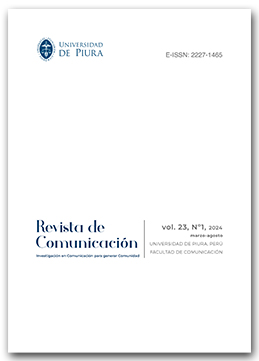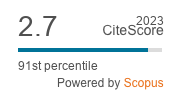Vertical video on mobile devices. Case study on TikTok, Instagram Reels and YouTube Shorts
DOI:
https://doi.org/10.26441/RC23.1-2024-3316Keywords:
social media, theory of image, audio-visual communication, TikTok, Instragram, Youtube, vertical video, formatAbstract
In the current context of social media, vertical video has become an emerging format for sharing content. From the perspective of audio-visual communication, the proliferation of mobile devices has promoted the popularity of the vertical video format on social platforms. This trend raises the need to understand its relationships, implications and influence. Objective: In this context, this research focuses on analyzing images on three leading platforms: TikTok, Instagram Reels and YouTube Shorts. Methodology: A comparative study was carried out on the three social platforms to know the characteristics and variables of genre, image (format, type, camera placement, recording space, shots, scenes, montage, continuity, audio and overlays) and time (structure, order and duration), and in total 1,194 audio-visual pieces were studied. Conclusions: From the sample it can be deduced that in the three social platforms moving images of vertical format predominate, of the entertainment genre, of a scene, recorded with the camera at eye level, indoors, with open shots and sequence, with continuity with cuts, with a linear and chronological structure, with music, with superimpositions on the image, and of variable duration.
Metrics
References
Abbott, W., Donaghey, J., Hare, J y Hopkins, P. (2013). An Instagram is worth a thousand words: An industry panel and audience. Library Hi Tech News 30(7), 1–6. https://doi.org/10.1108/LHTN-08-2013-0047
Adweek. (2020). Vertical Video is Five Times More Likely to Be Watched Than Horizontal Video. Adweek. https://www.adweek.com/digital/vertical-video-is-five-times-more-likely-to-be-watched-than-horizontal-video/
Alexander, J. (5 de agosto de 2020). Instagram launches Reels, its attempt to keep you off TikTok. The Verge. https://www.theverge.com/2020/8/5/21354117/instagram-reels-tiktok-vine-short-videos-stories-explore-music-effects-filters
Baer, A. y Schnettler, B. (2009). Hacia una metodología cualitativa audiovisual. El vídeo como instrumento de investigación social. En Merlino, A. (ed.), Investigación cualitativa en las ciencias sociales: Temas, problemas y aplicaciones (pp. 149-173). Cengage Learning.
Benítez-de-Gracia, M. y Herrera-Damas, S. (2018). El reportaje inmersivo en vídeo 360o: diseño de un modelo de análisis. El profesional de la información, 27 (1), 149-161. https://doi.org/10.3145/epi.2018.ene.14
Berges, F. [@fran.berges] (27 de marzo de 2023). Captura de pantalla. Instagram/Instagram Reels. https://www.instagram.com/reel/CqTrcu1DzXt/?igshid=MDJmNzVkMjY%3D
Binder, M. (18 de septiembre de 2018). There’s no going back now: YouTube fully commits to vertical video with new ad format. Mashable/Tech. https://mashable.com/article/youtube-vertical-video-ads/?europe=true#vyrPx7lOPaqw
Burgess, J., y Green, J. (2009). YouTube and the Emergence of Homecasting. International Journal of Cultural Studies, 12(4), 419-431. https://doi.org/10.1177/1367877909337862
Canella, G. (2018). Video Goes Vertical: Local News Videographers Discuss the Problems and Potential of Vertical Video. Electronic News, 12(2), 75–93. https://doi.org/10.1177/1931243117705417
Cantero-de-Julián, J, Sidorenko-Bautista, P. y Herranz-de-la-Casa, J. (2020). Radiografía de la pandemia: análisis de la cobertura periodística de la Covid-19 en portadas de periódicos. El profesional de la información, 29 (5). https://doi.org/10.3145/epi.2020.sep.23
Coma, O. (2 de marzo de 2022). Tamaño de imágenes y vídeos para redes sociales 2022. Welovewebs. https://welovewebs.com/tamano-imagenes-videos-redes-sociales-2022/
Dean, M. y Lastufka, A. (2009). YouTube: An Insider's Guide to Climbing the Charts. O'Reilly Media.
Dehan, L.; Van Ranst, W.; Vandewalle, P. y Goedemé, T. (2022). “Complete and temporally consistent video outpainting”, 2022 IEEE/CVF Conference on Computer Vision and Pattern Recognition Workshops (CVPRW), New Orleans (pp. 686-694). https://doi.org/10.1109/CVPRW56347.2022.00084
Gulati, S., y Jain, R. (2020). Understanding the Role of Video Orientation in Mobile Video Consumption: An Empirical Study. International Journal of Human-Computer Interaction, 37(15), 1545-1559.
Hale, J. (5 de julio de 2019). More Than 500 Hours Of Content Are Now Being Uploaded To YouTube Every Minute. Tubefilter. https://www.tubefilter.com/2019/05/07/number-hours-video-uploaded-to-youtube-per-minute/
Hallanan, L. (13 de junio de 2018). Why China’s Viral Video App Douyin is No Good for Luxury. Jing Daily. https://web.archive.org/web/20181212084421/https://jingdaily.com/douyin-not-for-luxury-brands/
Herrera, Ll. (15 de abril de 2022). YouTube Shorts: qué es, cómo crearlos y usarlos en tu estrategia. Rockcontent Blog. https://rockcontent.com/es/blog/que-es-youtube-shorts/
Hutchinson, A. (31 de enero de 2019). Instagram Stories is Now Being Used by 500 Million People Daily. Social Media Today. https://www.socialmediatoday.com/news/instagram-stories-is-now-being-used-by-500-million-people-daily/547270/
Ida (2019). Instagram cede y acepta el formato horizontal en IGTV. Ida blog. https://blog.ida.cl/estrategia-digital/instagram-formato-horizontal-igtv/
Influencer Marketing Hub (25 de mayo de 2020). 50 TikTok Stats That Will Blow Your Mind [Updated 2020]. Influencer Marketing Hub. https://acortar.link/M8tD5I
Instagram (5 de agosto de 2020). Presentamos Reels de Instagram. Instagram. https://about.instagram.com/es-la/blog/announcements/introducing-instagram-reels-announcement
IPSOS (2017). Global trends. Fragmentation cohesion y uncertainty. IPSOS. https://acortar.link/bNkbOc
Jaiswal, A. y Dhir, A. (2020). Influence of Format Type and Content Type on Mobile Video Consumption Experience: An Empirical Study on Perceived Quality, Emotions and Engagement. International Journal of Human-Computer Interaction, 37(15), 1465-1484
Jenkins, H., Clinton, K., Purushotma, R., Robison, A. y Weigel, M. (2009). YouTube as a participatory culture. En D. Buckinghan y J. R. Willett (Eds.), Confronting the Challenges of Participatory Culture: Media Education for the 21st Century (pp. 165-185). The MIT Press.
Jin, D. (2016). The Rise of YouTube: Content and Influencers. Journal of Creative Communications, 11(1), 1-14. https://doi.org/10.1177/0973258615617668
La-Información (6 de agosto de 2019). Cómo publicar una foto vertical en Instagram. La Información. https://bit.ly/3u5Yjpx
Lange, P. (2014). Youth's Engagement with YouTube: Production, Consumption and Interaction. En D. Buckingham y R. Willett (Eds.), Youth, Identity, and Digital Media (pp. 189-206). MIT Press.
latintiktoks1865 [@latintiktoks1865] (2023). Captura de pantalla. YouTube/YouTube Shorts. https://www.youtube.com/shorts/ppbtoiMgC-4
Lenis, A. (20 de enero de 2023). Qué es un reel en Instagram y cómo hacer uno, paso a paso. Hubspot. https://blog.hubspot.es/marketing/reel-instagram
León, S. (23 de enero de 2019). Instagram Stories supera el millón de usuarios activos: así ha sido su evolución. Habitant. https://habitant.es/instagram-stories-supera-el-millon-de-usuarios-activos-asi-ha-sido-su-evolucion/
Liang, S. y Wolfe, J. (2022). Getting a Feel of Instagram Reels: The Effects of Posting Format on Online Engagement. Journal of Student Research, 11(4). https://doi.org/10.47611/jsrhs.v11i4.3600
Lim, S. (27 de septiembre de 2018). Nobody will ask why they need vertical videos now: Snap on why it welcomes competition from rivals. The Drum. https://acortar.link/7fkuhb
Llonch, E. (7 de octubre de 2020). Youtube Shorts: qué es, cómo funciona y se crean vídeos. Cyberclick. https://www.cyberclick.es/numerical-blog/youtube-shorts-que-es-como-funciona-y-se-crean-videos
Manjoo, F. (12 de agosto de 2015) Vertical Video on the Small Screen? Not a Crime. The New York Times/Technology. https://acortar.link/U6VbNd
Manovich, L. (2017). Instagram and Contemporary Image. Manovich. http://manovich.net/index.php/projects/instagram-and-contemporary-image
Mike, I. (8 de octubre de 2020). U.S. Appeals Injunction Against TikTok Ban. The New York Times. https://acortar.link/CrWNig
Mulier, L., Slabbinck, H., y Vermeir, I. (2021). This Way Up: The Effectiveness of Mobile Vertical Video Marketing. Journal of Interactive Marketing, 55(1), 1–15. https://doi.org/10.1016/j.intmar.2020.12.002
Napoli, M. (2016). The ‘mobile effect’ on screen format: The case of vertical videos. Journal of Science and Technology of the Arts, 8(2), 45-49. https://doi.org/10.7559/citarj.v8i2.169.
Navarro-Güere, H. (2022). Mínima gramática de Instagram. Tres casos de estudio. En: Grana, R. (Coord.), Lo que segrega también nos conecta (pp. 675-693). Dykinson
Navarro-Güere, H. (2023). Vertical video. A review of the literature on communication. Revista Mediterránea de Comunicación, 14(1), 69-80. https://www.doi.org/10.14198/MEDCOM.23028Pew
Paz-Enrique, L. y Hernández Alfonso, E. (2017). Visual metric: guía metodológica para el análisis métrico de materiales audiovisuales. Cuadernos de Documentación Multimedia, 28 (1), 38-61. http://dx.doi.org/10.5209/CDMU.55519
Pérez-Ordóñez, C. y Sosa-Valcácer, A. (2022). El mito de los festivales de pop-rock como símbolo de la Contracultura a través de la creación audiovisual: de los documentales films festivals de los 70 a los aftermovies. En Gómez, Higueras y de Aguilera (coords.). Los caminos de la memoria en el cine y el audiovisual contemporáneos (pp. 175-193). Salamanca: Comunicación Social.
Pew Research Center (2018). Social Media Use in 2018. Pew Research Center. https://www.pewresearch.org/internet/2018/03/01/social-media-use-in-2018/
pprimor [@pprimor](18 de abril de 2023). Captura de pantalla. TikTok. https://www.tiktok.com/@pprimor/video/7223339486137126146?_r=1y_t=8bl39nYBqrD
Roettgers, J. (7 de marzo de 2018). Netflix to Introduce Mobile Previews With Vertical Video in April. Variety/Digital/News. https://variety.com/2018/digital/news/netflix-mobile-previews-1202721102/
Ryan, K. (2018). Vertical video: rupturing the aesthetic paradigm. Visual Communication, 17(2), 245–261, https://doi.org/10.1177/1470357217736660.
Simplified (24 de marzo de 2022). La guía definitiva para aprenderte el tamaño de vídeo para TikTok. Simplified. https://simplified.com/blog/es-es/marketing-y-branding/tamano-de-video-para-tiktok/
Skaf, E. (s.f.). 5 ventajas del videomarketing en formato vertical que cambiarán para siempre tu estrategia digita. Postcron. https://postcron.com/es/blog/videomarketing-vertical/
Slade-Silovic, O. (18 de septiembre de 2018). Horizontal VS Vertical Videos: Which Video Format Should I Use? Covideo. https://www.covideo.com/horizontal-vs-vertical-videos
Subsign. (20 de marzo de 2017). Vertical vs Horizontal Video. Subsign Medium. https://bit.ly/2G3IYKq
Sudarmanto, J. (2023). The The Evolution of Vertical Video: TikTok and the 21st Century Children’s Interactive Learning Trend. Education and Human Development Journal, 8(1), 59–70. https://doi.org/10.33086/ehdj.v8i1.3576
TikTok (2021). Company profile. TikTok. https://www.tiktok.com/about/
TikTok (2023a). How TikTok recommends videos #ForYou. TikTok. https://newsroom.tiktok.com/en-us/how-tiktok-recommends-videos-for-you
Tiktok (2023b). Guía de uso de TikTok. TikTok. https://support.tiktok.com/es/using-tiktok/creating-videos/camera-tools
Tiktok (6 de marzo de 2023c). TikTok, socio oficial del Festival de Cannes 2023. TikTok/Comunidad. https://newsroom.tiktok.com/es-es/tiktok-socio-oficial-del-festival-de-cannes-2023
Ting, H., Wong-Poh-Ming, W., De-Run, E. y Choo, S. (2015). Beliefs about the Use of Instagram: An Exploratory Study. International Journal of Business and Innovation, 2(2), 15–31. https://acortar.link/PyEQVr
Wang, L. y Sun, Y. (2020). The Impact of Video Orientation on Mobile Video Engagement: An Experimental Study. IEEE Access, 8, 141295-141305. https://doi.org/10.1109/ACCESS.2020.3013938
Wearden, S., Fidler, R., Schierhorn, A. y Schierhorn, C. (1999). Portrait vs. Landscape: Potential Users' Preferences for Screen Orientation. Newspaper Research Journal, 20 (4), 50-61. https://doi.org/10.1177/073953299902000405
Williams, O. (19 de febrero de 2019). Does Vertical Video Make a Difference? We Spent $6,000 on Tests to Find Out. Buffer. https://buffer.com/vertical-video
YouTube (s.f.-a). Introducción a YouTube Shorts. Ayuda de YouTube. YouTube. https://support.google.com/youtube/answer/10059070?hl=es
YouTube (s.f.-b). Resoluciones de vídeo y relaciones de aspecto. Ayuda de Youtube. YouTube. https://support.google.com/youtube/answer/10059070?hl=es
Downloads
Published
How to Cite
Issue
Section
License
Copyright (c) 2024 Revista de Comunicación

This work is licensed under a Creative Commons Attribution-NonCommercial-NoDerivatives 4.0 International License.












 Portal de Revistas de la Universidad de Piura.
Portal de Revistas de la Universidad de Piura.